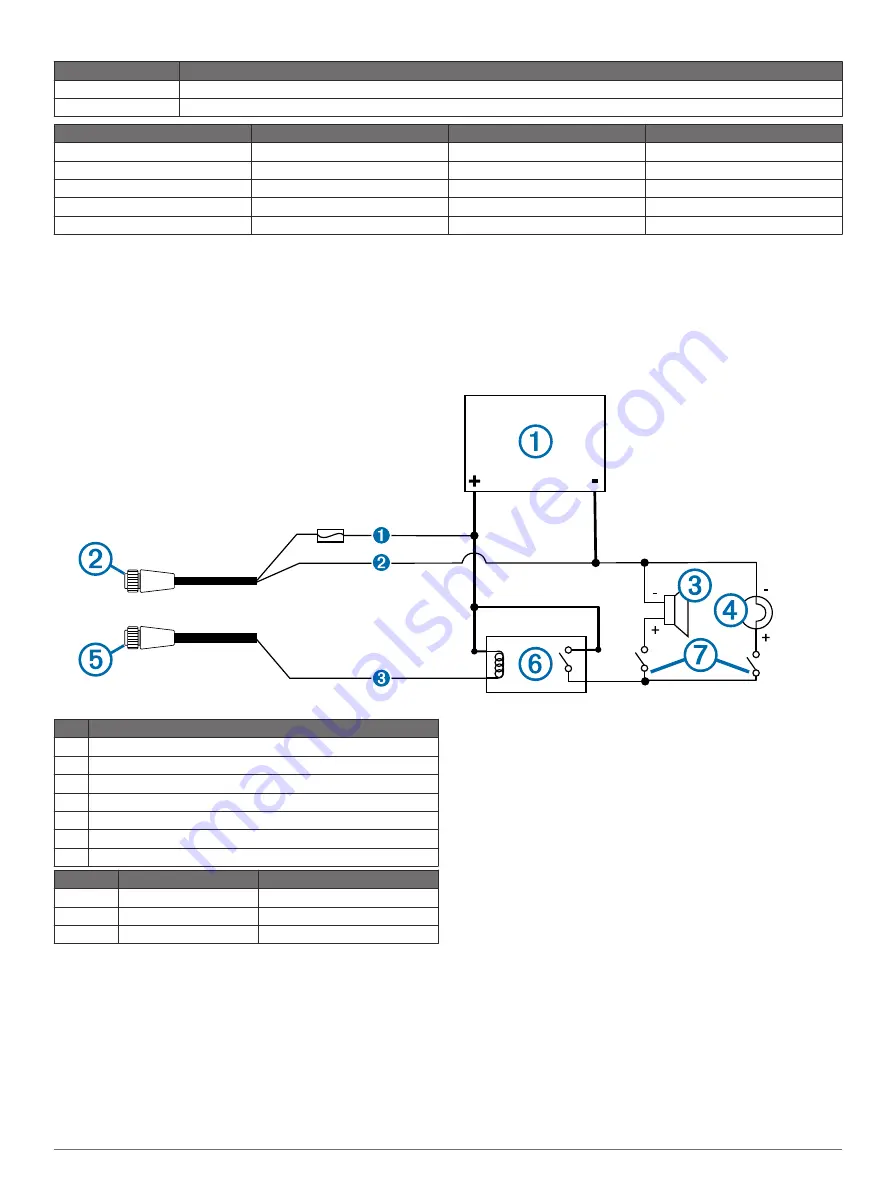
Item
Description
Â
NMEA 0183-compliant device
Ã
NMEA 0183 cable
Item
Garmin Wire Function
Garmin Wire Color
NMEA 0183 Device Wire Function
Ê
Power
Red
Power
Ë
Power ground
Black
Power ground
Ì
Data ground
Black
Data ground
Í
RxB (-)
Orange/white
N/A
Î
RxA (+)
White
TxA (+)
Lamp or Horn Connections
The device can be used with a lamp, a horn, or both, to sound
or flash an alert when the chartplotter displays a message. This
is optional, and the alarm wire does not need to be used in
order for the device to function normally. When connecting the
device to a lamp or horn, observe these considerations.
• The alarm circuit switches to a low-voltage state when the
alarm sounds.
• The maximum current is 100 mA, and a relay is needed to
limit the current from the chartplotter to 100 mA.
• To manually toggle visual and audible alerts, you can install
single-pole, single-throw switches.
Item Description
À
10–35 Vdc power source
Á
Power cable
Â
Horn
Ã
Lamp
Ä
NMEA 0183 cable
Å
Relay (100 mA coil current)
Æ
Toggle switches to enable and disable lamp or horn alerts
Item
Wire Color
Wire Function
Ê
Red
Power
Ë
Black
Ground
Ì
Yellow
Alarm
Video Input and Output Considerations
This device allows video input from composite, component, and
digital video sources, depending on the model, and video output
to a monitor. When connecting video input and output sources,
observe these considerations.
• The eight- and twelve-inch models have two composite-video
ports labeled CVBS 1 IN, and CVBS 2 IN. The fifteen-inch
models have four composite-video ports labeled CVBS 1 IN,
CVBS 2 IN, CVBS 3 IN, and CVBS 4 IN.
• The fifteen-inch models have one component-video port
labeled COMPONENT IN (480i/576i).
◦ The composite- and component-video ports use BNC
connectors. You can use a BNC to RCA adapter to
connect a composite-video source with RCA connectors
to these ports.
◦ The video from sources connected to these ports is
available only for display on the device or additional
monitor connected to the device. Composite or
component video is not shared across the Garmin Marine
Network or NMEA 2000 network.
• The fifteen-inch models have one video port labeled DVI-I
VIDEO IN that accepts video from digital or analog sources
using a DVI-D or DVI-I cable.
◦ If needed, you can use an HDMI to DVI-D converter to
connect an HDMI-compatible source to this device.
◦ If needed, you can use a VGA to DVI-I adapter to connect
a VGA source to this port.
• You can connect a display to the DVI-I VIDEO OUT port to
view a mirror image of the screen on a computer monitor or
HD TV using a DVI-D or DVI-I cable.
◦ If needed, you can use a DVI-D to HDMI adapter to
connect to an HD TV or other HDMI-compatible display.
◦ If needed, you can use a DVI-I to VGA adapter to connect
to a computer monitor or other VGA-compatible display.
• Although it is recommended to use DVI cables sold by
Garmin, high-quality third-party DVI cables may be used.
11
































